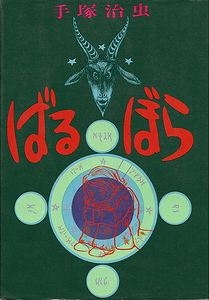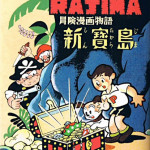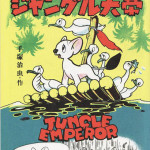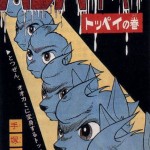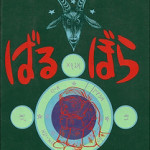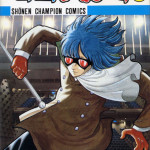Tezuka’s Manga (1970-79)
The Dark Years
With the failure of the company he founded, Mushi Productions, much of Tezuka’s work in the 1970s reflects his darker mood. Despite this, and indeed because of it, the 1970s really show Tezuka at his best. His artwork is now regularly highlighted by intriguing panel deigns and a more complex cinematography, while his themes become more morally mature and complex and his pacing, though still frenetic, is more even and balanced. This is a period of great manga production, both in terms of quantity and quality, as the punishing requirements of his commercial animation ventures are no longer vying for his creative energy.
Early on in the decade, Tezuka’s manga work turns towards biting social commentary – be it on sex education in Yakeppachi’s Maria (1970) or Apollo’s Song (1970), the medical establishment in Ode to Kirihito (1970-71), the insect-like qualities of human society in Book of Human Insects (1970-71), the American influence in the post-war shift in land rights in Ayako (1972-73), or even the very nature of an artist’s muse in Barbara (1973-74).
Even Tezuka’s biographical manga treatment of the life of Siddhartha Gautama in Buddha (1972-83), a series that intimately illustrates Tezuka’s own beliefs on reincarnation and the sanctity of life, cannot be called an overly optimistic one.
Tezuka’s dark mood also permeates his shōnen, or “boy’s” adventure mangas. Be it the total lack of heroes in Alabaster (1970-71), or, at best, the rise of the “tainted heroes” in his works such as the medical thriller, Black Jack (1973-83), or the “ancient civilizations” adventure, The Three-Eyed One (1974-78), none of them show the bright-eyed optimism of his earlier works in the 1950s and early 1960s.
However, by the end of the decade Tezuka gains control over the darkness and begins to wield it more like a surgeon’s scalpel than a baseball bat. Even in his most dedicated exploration of mankind’s capacity for evil, in MW (1976-78) one gets the impression he is using it to strategically provoke a response rather than simply overwhelming the reader. He is also able to use it to temper a series like Unico (1976-79), a children’s tale about a baby unicorn that could easily slide into sugary-sweetness, with a balanced dose of pessimistic realism.
Yet, as the 1970s come to a close, Tezuka seems to lose his appetite for crushing darkness and we see a return of levity in works like the slapstick comedy, Don Dracula (1979). Something that will continue on into the 1980s.
| Year(s) | English Title | Japanese Title |
| 1970 | The Television Age in 2001 | 2001年テレビ時代 |
| 1970 | Miraculous Conception | 聖女懐妊 |
| 1970 | The Black River | 黒い河 |
| 1970 | The Glass Castle | ガラスの城の記録 |
| 1970 | Dauberman | ドオベルマン |
| 1970 | Gachaboi’s Biography | がちゃぼい一代記 |
| 1970 | The Masterless Samurai | 一族参上 |
| 1970 | The Stranger | 赤の他人 |
| 1970 | The Tale of a Turtle | すっぽん物語 |
| 1970 | Guide to What’s Going on at the Expo | 万博ハプニングガイド |
| 1970 | The Legs of the Octopus | 蛸の足 |
| 1970-71 | 21st Century Adventure | アバンチュール21 |
| 1970-71 | Ode to Kirihito | きりひと讃歌 |
| 1970 | Yaketpachi’s Maria | やけっぱちのマリア |
| 1970 | The Clockwork Apple | 時計仕掛けのりんご |
| 1970 | Apollo’s Song | アポロの歌 |
| 1970-71 | Book of Human Insects | 人間昆虫記 |
| 1970 | The Record of Fusuke | フースケ風雲録 |
| 1970 | String | 紐 |
| 1970 | The Underground Trench | 地下壕 |
| 1970 | Bomba! | ボンバ! |
| 1970-72 | Marvelous Melmo | ふしぎなメルモ |
| 1970 | Tales of Tokiwa Apartments | トキワ荘物語 |
| 1970-71 | Yajiuma March | やじうまマーチ |
| 1970 | Blood Suckers | 現地調査 |
| 1970-71 | Phoenix (“Resurrection”) | 火の鳥 |
| 1970 | Deep Cave | ながい窖あな |
| 1970 | Voice | 声 |
| 1970-71 | Alabaster | アラバスター |
| 1971 | Giants and Toys | 巨人と玩具 |
| 1971 | New Liaozhai Zhiyi | 新・聊斎志異 |
| 1971 | The Love Letter | という手紙がきた |
| 1971 | Ripe Star | 熟れた星 |
| 1971 | The Transparent Brain | ガラスの脳 |
| 1971-75 | Rise of the Birdmen | 鳥人大系 |
| 1971-73 | Lion Books | ライオンブックス |
| 1971 | Reflection | 反射 |
| 1971 | Zephyrus | ゼフィルス |
| 1971 | Game | ゲーム |
| 1971-72 | Good Morning Cusco! | おはよう!クスコ |
| 1971 | One Fool | ばか一 |
| 1971 | The Laughing Man | 笑う男 |
| 1971 | Phoenix (“Robe of Feathers”) | 火の鳥 |
| 1971-72 | Little Wansa | ワンサくん |
| 1971 | Phoenix (“Intermission”) | 火の鳥 |
| 1972 | The Man with a Horn | 角 |
| 1972 | Get Out! | 出ていけ! |
| 1972 | Dust 8 | ダスト 8 |
| 1972 | Salome’s Lips | サロメの唇 |
| 1972 | The Goddess of Defeat | 負け女郎 |
| 1972-73 | Ayako | 奇子 |
| 1972-81 | The Adventures of Astro Boy | 鉄腕アトム |
| 1972 | The Fox | 孤聊 |
| 1972 | Human Beings on the Moon | 月世界の人間 |
| 1972 | Lady of the Rhine | ラインの館にて |
| 1972 | The Spirit of The Swamp | ぬし |
| 1972 | Nocturnal Guests | 夜の客 |
| 1972 | Yellow Dust | イエロー・ダスト |
| 1972 | Devil’s Mountain | 魔の山 |
| 1972 | The White Shadow | 白い幻影 |
| 1972-83 | Buddha | ブッダ |
| 1972 | Yamakagashi | 山棟蛇 |
| 1972 | Old Folk’s Home | 料理する女 |
| 1972-73 | Thunder Mask | サンダーマスク |
| 1972 | Lord Mogami Iechika | 最上殿始末 |
| 1972-73 | Tales of the Glass Castle | ガラスの城の記録 |
| 1973 | The Godfather’s Son | ゴッドファーザーのむすこ |
| 1973 | Revolution | レボリューション |
| 1973 | The Tale of Peter Kyulten | ペーター・キュルテンの記録 |
| 1973 | Homecoming | 帰還者 |
| 1973 | Lolo’s Journey | ロロの旅路 |
| 1973 | Microid S | ミクロイドS |
| 1973-74 | The Euphrates Tree | ユフラテの樹 |
| 1973 | Stereotype | ステロタイプ |
| 1973 | Sensual Nights | もの憂げな夜 |
| 1973-74 | Barbara | ばるぼら |
| 1973 | Adventures of Hanuman | ハヌマンの冒険 |
| 1973 | Ukyo Matsu’s Rhapsody | 大松右京のラプソディ |
| 1973 | Akuemon | 悪右衛門 |
| 1973 | Siblings of the Sea | 海の姉弟 |
| 1973-74 | Essay on the Idleness of Animals | 動物つれづれ草 |
| 1973 | The Starfish’s Secret | ひとでの秘密 |
| 1973-74 | Detective Danbukuro | 刑事もどき |
| 1973 | The Garbage War | ゴミ戦争 |
| 1973-83 | Black Jack | ブラック・ジャック |
| 1973 | The Devil’s Beginning | 悪魔の開幕 |
| 1974 | The Jumbo | ジャムボ |
| 1974 | Tiger Land | タイガーランド |
| 1974-75 | Kanpachi | カンパチ |
| 1974-75 | Lunatic Japan | 日本発狂 |
| 1974 | Okesa’s Hyoroku | おけさのひょう六 |
| 1974-76 | Shumari | シュマリ |
| 1974-75 | Melody of Iron | 鉄の旋律 |
| 1974-78 | The Three-Eyed One | 三つ目がとおる |
| 1974 | Canon | カノン |
| 1974 | The Rain Conductor | 雨のコンダクター |
| 1974-75 | Ikki Mandara | 一輝まんだら |
| 1974 | Paper Fortress | 紙の砦 |
| 1975 | Hungry Blues | すきっ腹のブルース |
| 1975 | Yaji and Me | ヤジとボク |
| 1975 | Sexodus | セクソダス |
| 1975 | A Thousand and One Stories | ぐうたろう千一夜 |
| 1975 | The Lower Angel | 低俗天使 |
| 1975 | The Boy in the Rain | 雨ふり小僧 |
| 1975-76 | Bagi, The Boss of the Earth | 大地の顔役バギ |
| 1975 | The Story of Stone | 原人イシの物語 |
| 1975 | Boy Detective Zunbera | ずんべら |
| 1976 | Dr. Doronko | どろんこ先生 |
| 1976 | Run Chronos! | 走れ!クロノス |
| 1976 | Horror Tales of Yotsuya | 四谷快談 |
| 1976-77 | Metamorphosis | メタモルフォーゼ |
| 1976 | Personal Offer | 人身御供 |
| 1976-78 | Phoenix (“Nostalgia”) | 火の鳥 |
| 1976-78 | MW | ムウ |
| 1976-79 | Unico | ユニコ |
| 1977 | Queer Aesop Fables | 珍イソップ物語 |
| 1977 | Tenteke March | てんてけマーチ |
| 1978 | The Bridge of Korosuke | ころすけの橋 |
| 1978 | Phoenix (“Civil War”) | 火の鳥 |
| 1978 | Futureman Kaos | 未来人カオス |
| 1979 | Mt. Monmon is Crying | モンモン山が泣いてるよ |
| 1979 | The Search for the Panther | パンサーを探せ |
| 1979 | The Two Shoguns | 二人のショーグン |
| 1979 | Fire Mountain [a.k.a. The Thief Inoue Akikazu] | 火の山 |
| 1979 | Lunn Flies into the Wind | るんは風の中 |
| 1979 | The Insect Collector | インセクター |
| 1979 | Don Dracula | ドン・ドラキュラ |
| 1979-80 | Pornographic Pictures | どついたれ |
| 1979-81 | Mako, Rumi and Chii | マコとルミとチイ |

